|
|
|
Sort Order |
|
|
|
Items / Page
|
|
|
|
|
|
|
| Srl | Item |
| 1 |
ID:
069163
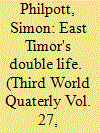

|
|
|
| 2 |
ID:
020921
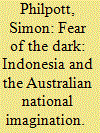

|
|
|
|
|
| Publication |
Nov 2001.
|
| Description |
371-388
|
| Summary/Abstract |
In late 1999, former Australian Prime Minister, Paul Keating, attacked the Howard government's handling of the East Timor crisis, arguing that John Howard had neglected the most important priority in the management of Australia's relationship with Indonesia. Citing the enormous population imbalance between the two countries, Keating argued that Howard had failed to 'square away' the potential threat arising from Indonesia's population of more than two hundred million people. Keating's invocation of this reason to be fearful seems distinctly at odds with his confidence and pride in Australia's relationship with Indonesia and his own personal closeness to former President Suharto during his period as Prime Minister. But the use of fear to win a political point in debates about Australia-Asia relations or to discipline Australian voters is far from unusual. Indeed, fear has been perhaps the dominant factor in shaping Australia's relations and policies towards Asia and the perceptions of a sceptical community.
This article argues that fear is an integral and inescapable element of Australia's relations with Indonesia. However, rather than presenting fear as evidence of flawed diplomacy or as being necessarily irrational, I argue that fear is a constitutive element of relations with Indonesia in much the same way that trust has been an enduring feature of Australian relations with the United States. There have been, of course, many critics of unquestioning Australian alignment with United States' foreign policy and, equally, there have been critics of the various manifestations of Australian policy towards Indonesia over the years. It is not my intention to suggest that Australian attitudes to Indonesia have been without contradictions or that they remained unaffected by changes in Australia, Indonesia and the region more generally. Among politicians on both sides of parliament and among journalists and academics there have been many who have sought to improve what has been a troubled relationship.
But despite these efforts, Australian attitudes towards Indonesia are partly constructed in immutable discourses of fear and anxiety. The images and metaphors used to describe Indonesian society and assumptions about 'our' and 'their' national character reflect an enduringly negative view of Indonesia. Moreover, politicians, journalists and academics alike are caught up in this historical web of anxieties and fears. Seemingly routine and benign descriptions of Indonesia's 200 million plus population, its low levels of political and economic development and its status as the world's largest Muslim nation, all play deeply on white Australian fears of Asia even if the authorial intention is to alleviate concerns about Indonesia among Australians.
This article explicitly discusses the politics of fear in modern Western societies and explains how domestic anxiety about the policies of multiculturalism and immigration overlap with other concerns about events and peoples external to the Australian nation. Later, I analyse particular images that have been used to describe Indonesia and argue that not only do they have antecedents in colonial depictions of Indonesia but also tend to imply that Australian values and attitudes are superior. Finally, I argue that the key to establishing better relations with Indonesia is not a clearer understanding of 'them', but an ongoing and thoughtful unpacking of the values and fears that constitute 'us'.
|
|
|
|
|
|
|
|
|
|
|
|
|
|
|
|
| 3 |
ID:
096967


|
|
|
|
|
| Publication |
2010.
|
| Summary/Abstract |
War-on-terror-themed fictional films, particularly those focused on the war in Iraq, have largely failed at the box office and have been subjected to stinging criticism by right-wing political commentators and film reviewers. Critics on the political right have been upset by a perceived lack of patriotism in the films, often arguing that they are dangerous incitements to new acts of violence. However, unlike many earlier war films, including those made about the conflict in Vietnam, directors of films about the war on terror are quite self-consciously making political films that question United States (US) policy and practice, that focus on the effects of war on US service personnel and civilians in Iraq and Afghanistan and that, significantly, attempt to rehabilitate Arabs, Muslims and Islam from decades of Hollywood demonization. Moreover, the films are being made and released into a media environment in which quality news reporting has declined even as the intensity of feeling about 'otherness' has sharpened. This article argues that war on terror film directors are themselves bearing witness to the tragedy of war and thereby inviting film audiences to see the effects of war.
|
|
|
|
|
|
|
|
|
|
|
|
|
|
|
|
| 4 |
ID:
155145
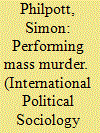

|
|
|
|
|
| Summary/Abstract |
The massacre, torture, persecution, and imprisonment of real and imagined communists and sympathizers in mid-1960s Indonesia was among the greatest state-sponsored atrocities of the twentieth century and yet remains little known and even less understood outside Indonesia. An elaborate mythology about the supposed communist coup attempt of September 1965 was foundational to the military government’s legitimacy discourses. The dead, the tortured, and the imprisoned remained an existential threat to Indonesia’s survival according to these discourses, and yet they could not be spoken of, or acknowledged without fear of retribution from the state. This article explores one attempt to break the silence surrounding the massacres and to make visible the suffering of millions of Indonesians; it does so through an analysis of the documentary film, The Act of Killing, in which a number of those involved in mass murder re-enact their killings. It explores the contribution of the film to understanding the politics of mass murder through an interrogation of the history it purports to address and through the methods employed by filmmaker Joshua Oppenheimer. It concludes that while the film is a singular achievement, it fails as a political intervention aimed at deepening understanding of the mass killings.
|
|
|
|
|
|
|
|
|
|
|
|
|
|
|
|
| 5 |
ID:
152081
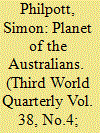

|
|
|
|
|
| Summary/Abstract |
This article examines the Australian Football League’s (AFL) diplomatic efforts to bring about recognition and reconciliation between Indigenous and non-Indigenous players, and to make a broader contribution to inter-communal relations. The AFL’s primary diplomacy has focused on classical racism, dealing with instances of on-field abuse of players by other players and with spectator education about racism and Indigenous culture in Australia. Despite successes in these areas, the AFL has notably failed to acknowledge structural, institutionalised modes of discrimination and exclusion, with the result that the sport remains deeply influenced by colonial thought and discourse concerning Indigenous Australians.
|
|
|
|
|
|
|
|
|
|
|
|
|
|
|
|
| 6 |
ID:
159158
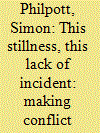

|
|
|
|
|
| Summary/Abstract |
This article examines how the ongoing conflict in West Papua between state security forces and Papuan independence activists is made visible in activist social media postings in their attempts to draw attention to the violence, abuses, and problems in Indonesia’s easternmost province. The use of social media may provide new avenues for raising awareness about the conflict and its consequences. However, a social media strategy that contrasts the innocence and justness of the Papuan people with the violence and barbarity of other Indonesian peoples and the state risks entrenching established tropes which may serve to discourage broader support for West Papuan pleas for justice and independence.
|
|
|
|
|
|
|
|
|
|
|
|
|
|
|
|
| 7 |
ID:
089481
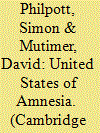

|
|
|
|
|
| Publication |
2009.
|
| Summary/Abstract |
This article interrogates the ways in which the United States 'forgets' the consequences and effects of its foreign policy in the making of its identity. In particular, the article argues that such forgetting enables the United States government to frame its interventions in world affairs as innocent and morally driven. Literature on collective memory and the forgetting that enables the production of such memory informs one element of the argument. Three contemporary films from the amnesia genre are analysed to provide insights into the kind of American identity forged in the acts of remembering and forgetting, illustrating the argument that remembering and forgetting are complex, voluntary and at times mendacious processes. The article concludes with the observation that the processes of forgetting past action when framing the context of new interventions make the United States a dangerous force in global affairs.
|
|
|
|
|
|
|
|
|
|
|
|
|
|
|
|
|
|
|
|
|